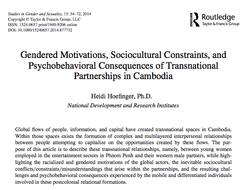
Two years later, Melissa and I presented on a similar panel with Trude at the Cambodia Studies conference in 2012, called *Intimate Contexts*. The panel rationale at that conference was as follows:
Inter-personal connections, in which sexual activity forms a major component of the nature of the relationship, are by their nature private. The sanction of relationships such as marriage may be performed publicly, but the nuances of daily life often go unrecognized and ill-understood. Only through elite-authored legal texts and didactic codes can such relationships be evaluated in the distant past; rarely does the scholar find a human story upon which to base hypotheses of the lived experience. By contrast, ethnography permits a multiplicity of voices to be heard. The result is a series of conflicting notions of intimate contexts over time, as perceived by scholars whose biases may have prevented them from seeing the true nature of such relationships. This panel seeks to address this imbalance by presenting papers that reorient intimate contexts away from western traditional perspectives and speak to the Cambodian social milieu with its particular historical and cultural trajectories.
The papers in this new special edition of Studies in Gender and Sexuality range across debt bondage, commercial sexual transactions, professional girlfriends, and transnational partnerships. My paper is titled "Gendered Motivations, Sociocultural Constraints, and Psychobehavioral Consequences of Transnational Partnerships in Cambodia" (50 free copies are available for download with this link. If that doesn't work, try this link). The paper is about what motivates Cambodian hostess bar workers and western men to engage in relationships, and then what happens when cultural misunderstandings take place and expectations aren't met. Here's the abstract:
Global flows of people, information, and capital have created transnational spaces in Cambodia.Within those spaces exists the formation of complex and multilayered interpersonal relationships between people attempting to capitalize on the opportunities created by these flows. The purpose of this article is to describe these transnational relationships, namely, between young women employed in the entertainment sectors in Phnom Penh and their western male partners, while highlighting the racialized and gendered motivations of the global actors, the inevitable sociocultural conflicts/constraints/misunderstandings that arise within the partnerships, and the resulting challenges
and psychobehavioral consequences experienced by the mobile and differentiated individuals involved in these postcolonial relational formations.
I would love and thoughts or comments!

 RSS Feed
RSS Feed